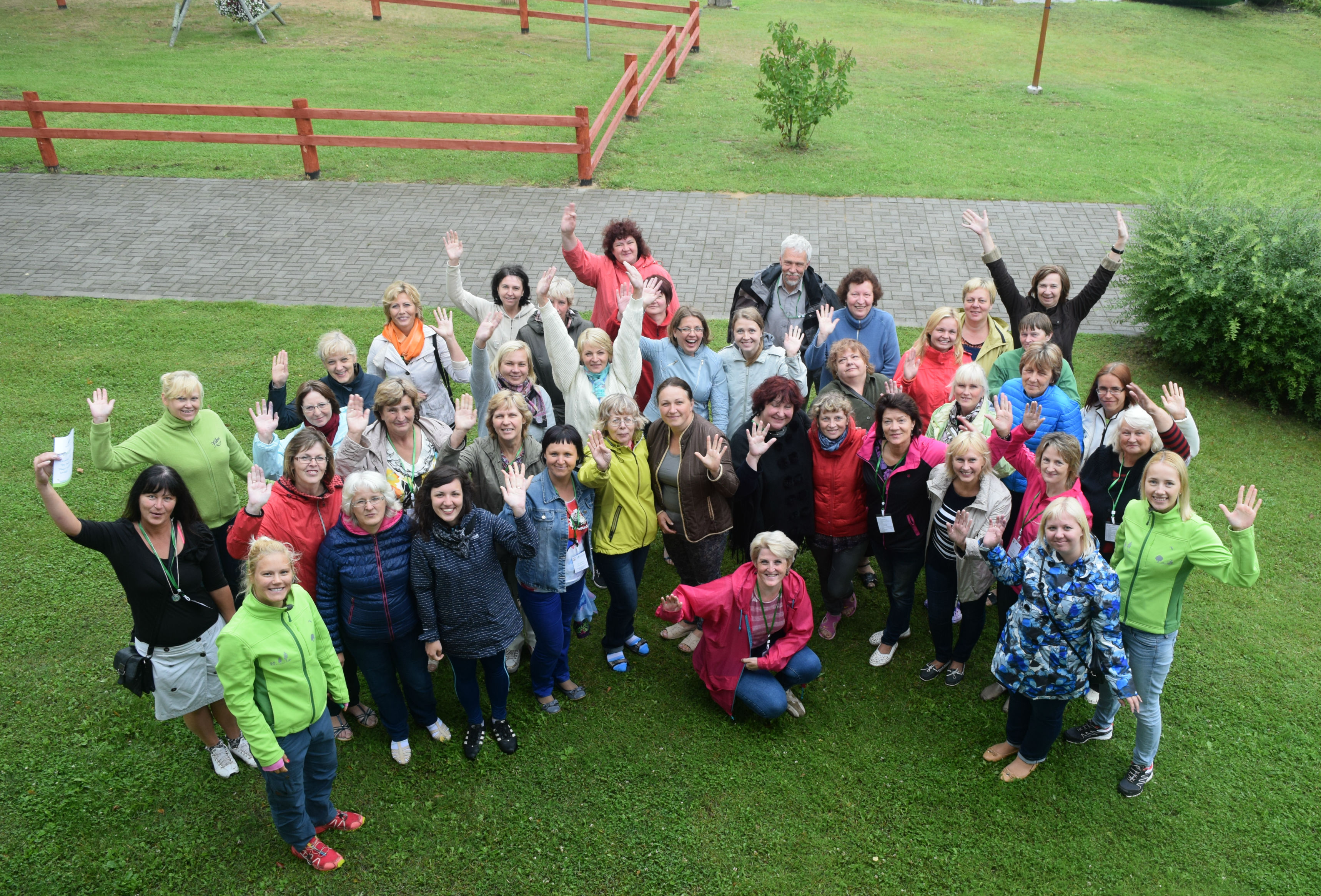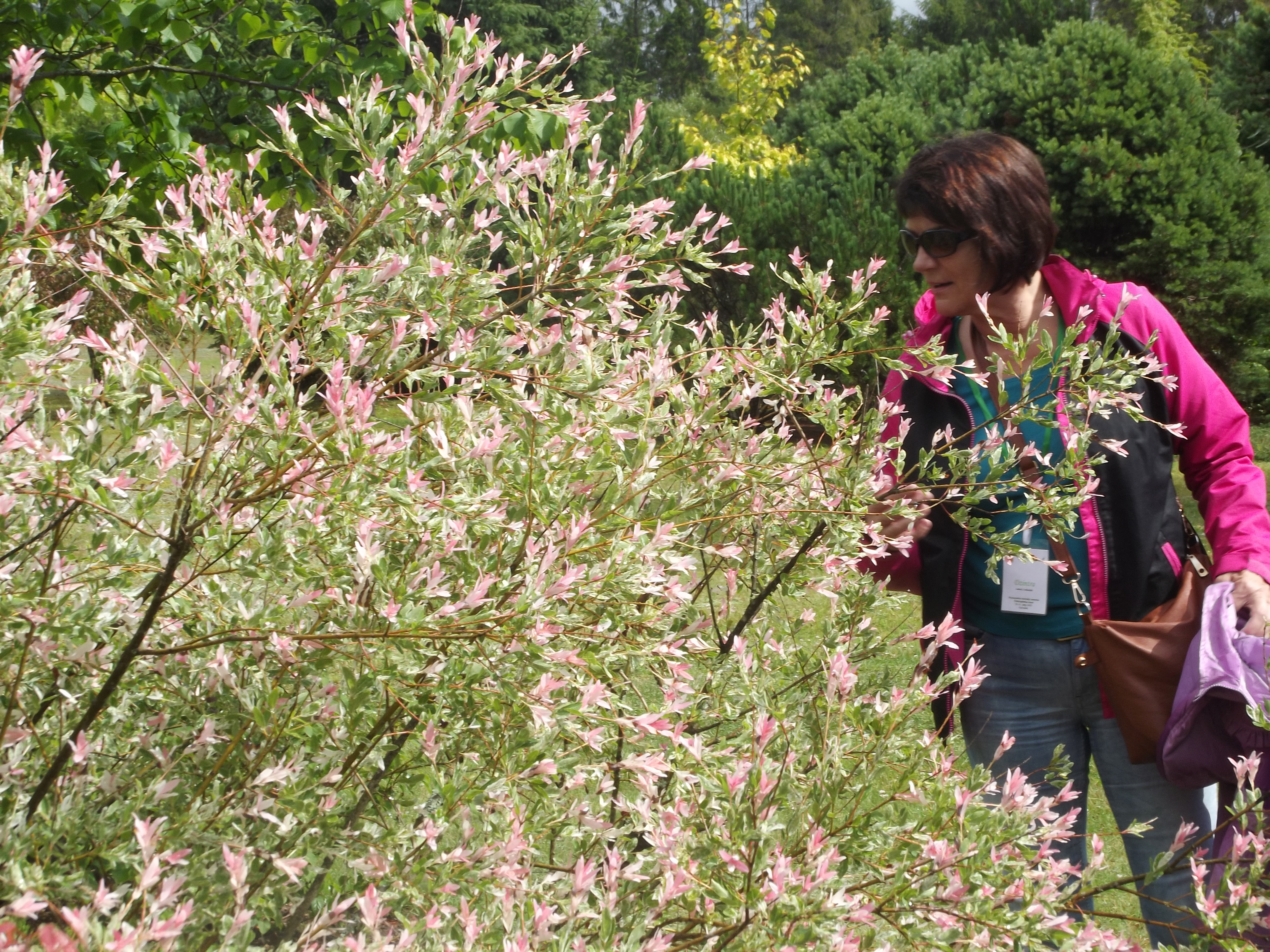
Forecasts about storms and heavy showers did not prevent the 40 most active teachers of the program "Izzini mezu" (Learning About Forests) to enter the forest, visit tree and cone-seed nurseries, participate in "Mammadaba deka" (Mammadaba Adventure), climb trees, and solve complicated tasks in the forest – all this and more took place on a camp for teachers for three days.
The teachers' camp – a 36-hour further education course for teachers – is being organized by LVM, in collaboration with "Meza un koksnes produktu petniecibas un attistibas institute" (Institute for Forest and Wood Product Research and Development) (MeKA) for the 8th year. "Our goal is to educate and introduce teachers to forest, forest industry, and forest management from a professional point of view. By understanding these processes, the teachers will be able to pass on this knowledge to their students," says Kaspars Rize, senior forest expert at LVM.
How?
The camp's activities began on the 23rd floor of the Agriculture Ministry, where Forest Department Deputy Director Ilze Silamikele addressed the teachers, telling them about the importance of environmental education and latest developments in Latvia's forest industry.
"How beautiful and fuzzy the cream-colored smoke tree is, and how fragrant the bog myrthe is, scaring away mosquitos and gadflies," said the teachers upon arriving at the Kalsnava Arboretum. Dendrologist Benite Rudzite introduced the teachers to the variety of forest environmental education, and shared useful advice on how to teach children about plants, while allowing them to imagine, feel, and smell.
Meanwhile, the Kalsnava Arboretum's director, Janis Zilins, allowed the teachers to get familiar with the tough, but exciting daily life of an arborist – climbing trees. "Now or never!" With these words the bravest teachers not only listened to the arborist's stories, but also accepted the challenge to climb "above the ground."
Many teachers said that they had visited the historic Vijciems cone-seed nursery with their students. "LVM Seeds and Seedlings" Director Guntis Grandans explains the seed acquisition process and how the seeds end up in forests. The teachers were so enthralled that they began planning their next visit the modern Kalsnava cone-seed nursery together with their students. Upon opening a door to the Podini Nursery greenhouse, the teachers unanimously say: "How beautiful and warm! The children must see this!" In the middle of bright greenery, a primary school teacher from Cesis ponders a healthy lifestyle and the necessity for peace in the mad rush daily life. "Our little students and I are designing our own lessons, allowing them to proceed in a specific manner – sometimes we read and study, other times we sing and jog. Children nowadays know little about nature and eco-friendly lifestyles," says the teacher.
Forest – another reality
"We usually go outside with the children during the natural science classes, but I know that other lessons can be taught as well. When in nature, children learn to identify tree leaves by observing and touching them. They especially like experiments, which they are carefully preparing for. Nature stimulates imagination. The city has limits, but the forest offers freedom, allowing fantasy to work, for example, imagining an unexpected meeting with a wolf. For children, nature is like another reality," says a teacher from Ventspils.
With the first sunbeams and bird songs, the teachers went on an unusual morning exercise. With binoculars and a box of "tools", ornithologists of Latvian Birds' Fund, Kaspars Funts and Ivars Brediks, went into the night to check hatchlings that were caught in the nets. "Aren't they in pain? Do you change the metal ring at some point? How is the acquired information processed and exchanged? How big will the bird be? Is the weight food?" these were some of the questions the teachers asked, while the experts measured, weighed, ringed, and examined the hatchlings.
After the morning exercise, employees from LVM gave educational presentations on cooperation with schools for the next semester, as well as on the importance of bioeconomy in our lives. Director of the Latvian Forest Industry Federation, Kristaps Klauss, invited to a discussion on correlation between demand and offer in the forest industry. "The lecturers offered a lot of new information and understanding about the energy of nature and bioeconomy," says a teacher from Cere.
Tasting nature with all five senses. Learning in the forest
LVM senior forest expert Kaspars Riže invited teachers to get out of their chairs and enter the nature. To forest – to use forest tools in a practical manner, to get inspiration for ideas on how to give lessons in forest using the minimum amount of resources, how to educate children about the forest in a perceptible way. Armed with a measuring-tape, wit and knowledge, the teachers learnt how to determine the tree's growth, count growth rings, calculate the trunk volume, and, while nibbling on forest berries, reach an agreement on the ripening period of forest berries.
During the educational excursion, the teachers learned about the forest cycle and gained answers to the expert question "What do we see here?" Look on the right, look on the left, and the teachers were able to determine the age and contents of a forest stand, differentiate a well-managed forest from a poorly-managed one, become familiar with the biotope, and observed the capercaillie.
A teacher from Laurenci School says that practical lessons in forests foster a much better understanding about forest growth, and the human role in the process. "During these days, I felt man's huge responsibility while being and working in nature, as well as how puny man is in the face of nature. Everything is so simple and at the same time complicated," says a teacher from Jelgava.
"The hemlock needs to be photographed, so the students know how it looks like," says teachers while walking down the Titumnieki Trail. Environmental guide Anna Macane escorted the teachers through the bog trail, telling them about the plants that grow there.
Asked about the most significant things that should be remembered when teaching environmental studies to the students, the teachers agree – listening, smelling, feeling, and tasting nature! During a demonstration lesson on the final day, the teachers assumed the role of students and demonstrated the most interesting ideas on what and how to teach children, thus mutually exchanging ideas. For example, one teacher urged to take pictures of the current season's characteristics in order to describe each of them. Meanwhile, another teacher invited her students to assume the role of hatchlings and describe the discovered chaffinch nest. Another teacher presented various conifer trees by describing, drawing, touching, smelling, and, just in case – by tasting them.
Lessons in nature are unimaginable without physical exercise. Armed with a map and compass, the teachers trekked over tree roots, dried-up twigs, green moss and ferns to go on the "Mammadaba dēka" adventure. "I teach students to orientate in the forest; the children and I are moving and performing. Points that are hardest to find, are well-hidden and are thus the best; I call them "berries"," says a teacher, teaching her colleagues about reference marks on the map.
"I organize various camps for the children, also involving the parents. We take part in competitions, hikes. The children love our lessons. I myself am very interested in them. If we want something, we do it! I gained a lot of positive emotions on this camp; I met attractive and similar colleagues, with whom I will definitely get in touch again. We will try to work even more diligently and achieve more in order to become true Masters of the Mammadaba master class. We have ideas, and we will succeed," according to an energetic teacher from Jelgava.
Mammadaba Master Class – 10
This year, the Mammadaba Master Class turns 10. To mark of this event, a birthday cake and greetings from Rachel Boyle, the head of the Foundation for Enviromental Education (FEE) program "Learning About Forests": "You are the ones who change the thought process in children. By confucting lessons in natural surroundings, they gain a lot more, extend their horizon, and explore nature from nature! I especially want to stress the quality of "Learning About Forests" in Latvia and the thought-out program - among the leading programs of the World Environmental Education implementers! I am glad that so many teachers and students have the opportunity to attend courses outside, in nature, and acquire knowledge not only from paper on a desk!"
The Mammadaba Master Class is a regular and comprehensive opportunity for schools to bring the studying process closer to nature. It allows teachers and students to acquire the environmental education program "Learning about the Forest" through active recreation in Latvian state forests.

